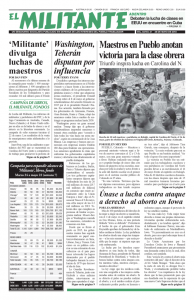VANCOUVER, British Columbia — A major conflict has developed between competing wings of the Canadian New Democratic Party — the one in power in Alberta and the one in power in British Columbia — over continuing the expansion of the Trans Mountain pipeline to triple the amount of shale oil it can carry to port on the Pacific. The pipeline was originally built in 1953. The aim of Canada’s oil barons is to step up sales and profits by exporting more oil to markets in Asia and the U.S., but the expansion will result in a major increase in tanker traffic in Vancouver’s Burrard Inlet.
Backing the expansion are the Liberal Party-led federal government; the NDP government in Alberta; Kinder Morgan, a major U.S. pipeline company that is building the Trans Mountain expansion; the oil bosses centered in Alberta; and most bosses in British Columbia. Some indigenous groups also support the project.
The previous Liberal Party-led government in British Columbia backed the pipeline, reflecting the big-business interests who see profits from increased exports of oil.
But the current NDP government — allied with the Green Party, environmental groups and many indigenous organizations — is opposed. They hope their pro-Green position will aid their ongoing electoral ambitions. At the same time, they’re committed to advancing capitalist interests, and are supporting a big natural gas project that involves a liquefaction plant, pipeline and a new port on the Pacific Coast.
The Alberta Federation of Labour supports the expansion. The British Columbia Federation of Labour takes no position. Some union officials are for it, seeing more jobs involved, while others see less benefit for themselves and are opposed.
The British Columbia government has centered its opposition on the danger of oil spills contaminating the land and water. As long as this is in the hands of the capitalist exploiters, this danger is real.
The Communist League here joins this debate, talking to workers on the job, at their doorsteps, at labor actions and other protests. It isn’t oil, or pipelines, or tankers that are the cause of pollution or fouling the environment, we explain. The cause is the capitalist mode of production and the bosses’ indifference to workers’ safety and to nature in their relentless drive for profit.
We say so-called Green politics is just another form of class-collaboration that leads away from the fight for independent working-class political action and the conquest of power by workers and farmers — the only road to defend labor and the earth’s land, waters and atmosphere.
Bourgeois debate
Both the Alberta and British Columbia provincial governments are led by the New Democratic Party, a pro-capitalist party that had its origins in the labor movement. Today it competes for support from the capitalist rulers to vie for office against the Liberals, Conservatives and other bourgeois parties in Canada.
NDP Premier John Horgan says the British Columbia government is defending “the interests of British Columbians.” The federal government says it is defending the interests of all Canadians. But there is no “we” — Canada is class-divided. And the capitalist exploiters have zero interest in the needs and conditions of working people.
In retaliation for the British Columbia government’s opposition to the pipeline, the Alberta government banned the import of wine from British Columbia Feb. 6. It also introduced legislation April 16 threatening to cut the flow of oil to British Columbia. The NDP government in British Columbia is asking the courts to decide if it can take control of the flow of oil into the province.
In the midst of this intra-NDP throwdown, Kinder Morgan suspended all nonessential spending on construction April 8 and set a May 31 deadline to decide on the future of the expansion project.
The federal government in Ottawa insists the new pipeline will be completed. “We are actively pursuing legislative options that will assert, thus reinforce, the government of Canada’s jurisdiction in this matter,” Canadian Prime Minister Justin Trudeau said April 15.
Thousands demonstrated at the Trans Mountain construction site in Burnaby March 10, demanding an end to the pipeline expansion. Some 200 have been arrested for violating an injunction that prevents blocking entry to the construction site.
Some First Nations groups oppose the expansion project, which crosses tribal lands. With total disregard for their sovereignty, the government didn’t consult with them on the expansion.
One way or another, Canada’s capitalist rulers will assure the oil will be brought to British Columbia and shipped out for profit. Thousands of kilometers of pipelines have already been built and more is planned.
If trains are used to haul the oil instead, the danger is higher. In their drive for profits, the rail bosses have slashed crews, lengthened hours and increased the danger for workers and those who live near rail lines. This was illustrated dramatically by the oil train explosion that killed 47 people in Lac-Mégantic, Quebec, in July 2013. Nevertheless, the use of trains to transport oil is being expanded in Canada in face of the lack of pipeline capacity.
Under capitalism the transport of oil and other volatile or toxic substances by pipeline, rail or truck is carried out with contempt for workers’ lives and limbs and for nature. Only through organizing to fight for workers control over production can workers gain some control over safety and the pace of work on the job and to protect the environment.
I talked on the phone with a rail worker from Calgary, Alberta, and we got into a discussion on the pipeline debate. “Trains stop, trains break down. A pipeline is so much more efficient. It is continuous,” he said. When I raised that workers through their unions should have control over safety, he agreed. “Safety is part of what we workers care about,” he said, asking that his name not be used because he was afraid of reprisals from his boss.
Because we have no control over job conditions and safety, he said, whenever there’s a problem, the company blames it on the workers.
Workers are not driven to toss aside safety or concern for nature at the altar of maximizing profits. Their interest lies in the health and safety of both land and labor.
Michel Prairie in Montreal contributed to this article.

